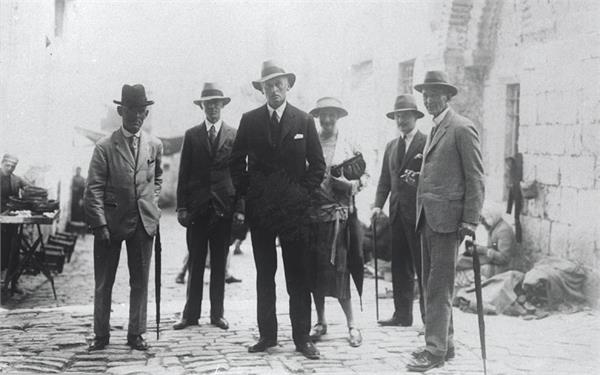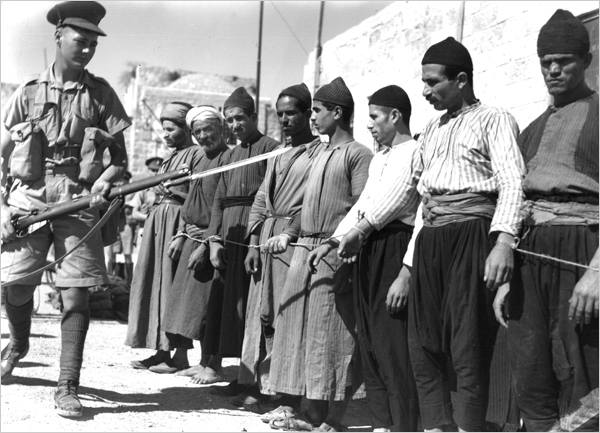Learn about the history of the Palestinian struggle for freedom, equality and justice by exploring major events in the history of their oppression on this day of the year.
25 October
 ROOT CAUSE OF PALESTINIAN ANTI-JEWISH RIOTS
ROOT CAUSE OF PALESTINIAN ANTI-JEWISH RIOTS
On this day in 1929, Britain’s Shaw Commission opened its ten-week investigation into the reasons for the inter-communal rioting and killing in Palestine in late August 1929. It reported that “there had been no recorded attacks of Jews by Arabs” until “large sales of land in consequence of which numbers of Arabs were evicted without the provision of other land for their occupation...In consequence a landless and discontented class is being created. Such a class is a potential danger to the country”.
السبب الاساسي للشغب الفلسطيني ضد هجرة اليهود
25 أكتوبر
في مثل هذا اليوم من عام 1929، فتحت لجنة شو البريطانية تحقيقها الذي استمر عشرة أسابيع في أسباب أعمال الشغب والقتل الطائفي في فلسطين في أواخر أغسطس 1929. وذكرت أنه "لم يتم تسجيل أي اعتداء على اليهود من العرب"، الى ان “بيعت اراضي شاسعة للصهاينة مما أدى إلى إخلاء عدد من المواطنين العرب من منازلهم دون توفير أراضٍ أخرى كمصدر رزق ومكان اقامة لهم ... ونتيجة لذلك، نشأت طبقة ساخطة بلا أرض. مثل هذه الطبقة خطر محتمل على الدولة"
The Shaw Commission concluded (contrary to Zionist mythology):
“There can, in our view, be no doubt, that racial animosity on the part of the Arabs, consequent upon the disappointment of their political and national aspirations and fear for their economic future, was the fundamental cause of the outbreak of August last. In less than ten years three serious attacks have been made by Arabs on Jews. For eighty years before the first of these attacks there is no recorded instance of any similar incidents. It is obvious then that the relations between the two races during the past decade must have differed in some material respect from those which previously obtained. The Arabs have come to see in the Jewish immigrant not only a menace to their livelihood but a possible overlord of the future. (Paras 41-43)
According to one historian, 1929 witnessed
"a major Arab insurrection [with] violence that rocked Jerusalem, Safad, and Hebron, and the massacres of Jews in the latter two cities, over half of the colonies in the country were attacked. At least ten were temporarily evacuated and up to seven destroyed outright. ‘Murderous assaults, robbery and arson were widespread’ and Jews abandoned fledgling settlement efforts inside Acre, Beisan, Beersheba, Tulkarm, Nablus, Ramle and Gaza.
Villagers and Bedouin were central actors in the uprising. Elite leaders, on the other hand, were aghast at the violence, believing it threatened their preferred course of diplomacy, and issued a cross-factional call – which the Arab public ignored – for the immediate restoration of public order. At the end of the weeklong tumult 133 Jews and 116 Arabs had been slain, with hundreds more injured on both sides.
Although the insurrection had the appearance of being, and to some extent actually was, religiously inspired, its deeper wellsprings were tied to the increasing political and economic marginalisation experienced by th e Palestinians. This was vividly attested to by the Shaw Commission, which was sent to investigate the ‘disturbances’.
e Palestinians. This was vividly attested to by the Shaw Commission, which was sent to investigate the ‘disturbances’.
Addressing the peasantry specifically, it expressed the opinion that ‘the feelings of the fellah’ in relating Jewish immigration to ‘unemployment and distress’ were ‘a legitimate deduction from the facts as presented to us’. Further, it tellingly summarised rural anxieties by way of reference to the situation at Wadi al-Hawarith, where poor Bedouin were embroiled in a struggle to retain their lands after their absentee (Lebanese) landlord sold them to the Jewish National Fund (JNF)...
Rural Arab struggles against political, social and eco-nomic dispossession were integral to the history of British Palestine. Peasant agency and unrest broadly shaped relations between the Arab population and the colonial state and played an important part in forging the rebellious course of the Palestinian national movement in the 1930s. Animated by the struggle to stay on the land and to reject their political and economic marginalisation, peasants and Bedouin resisted the colonial order and its agenda of supporting the Zionist project...
At the everyday scale, they flouted or blunted British attempts to ‘reform’ the land regime, while more episodically they rose up in armed or violent insurrections. The British regime responded to the latter through collective punishment, which especially after 1929 came to increasingly characterise its approach to rural discontent and to the Palestinians writ large. As socioeconomic conditions wors-ened for the rural Arab majority during the first two decades of British rule (1917-36), the restive current that developed in the countryside helped to radicalise the Pales-tinian national movement while also bringing to the fore class tensions within Arab society. This set of relations culminated in the major peasant-led uprising known as the Great Revolt (1936-39) and the ensuing military suppression of Palestinian society and its independence movement.
